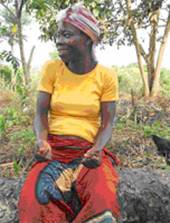|
|
Willing One's Way to Autonomy
The Red Cross

Blamacee refugee camp, 30 minutes north of Monrovia. A woman in her forties, a few months pregnant, is toiling away at the wash, bent over her laundry basin. Musu gets up to shake our hand. A thin scarf covers her hair. Her pagne body wrap, loosely tied around her waist, barely covers her expanding belly, pregnant with her sixth child.
Words do not come easy when we are faced with bad memories. In 1997, Musu's husband was brutally murdered by the rebels. In the blink of an eye, she became a single mother of five children, without any money, in a country devastated by war. "I suffered so much," she explains, "always walking barefoot, unable to afford even a pagne. I would beg villagers for a bit of rice for my children, but they would chase me away, sometimes beating me with a stick."
Driven by an unfaltering instinct for survival, Musu returned to her village, Sass Town, north of Monrovia in Bomi County, where she farmed small plots of land belonging to inhabitants in exchange for a share of the crop. But life remained precarious for Musu and her family. In 2000, she went to the Blamacee camp, where she at least had a roof over her head and her children could go to school.
In September 2004, in Liberia, the ICRC launched a market-gardening support programme for single mothers and widows, the aim of which was to encourage people to re-engage in a subsistence activity. Since Musu had gardening experience, she was one of the candidates selected by a team of Monrovia-based agricultural specialists. Over four months, she was taught how to grow certain vegetables that are somewhat unfamiliar to Liberians, such as onions, cabbage and lettuce. Because these products are rare on the market, they are sold at a relatively high price and are thus profitable. The trainees applied the techniques they learned on a test garden, and, if successful, were given tools and a dozen or so seed samples. Similar projects have been launched with ex-child soldiers from Lofa and Nimba Counties, two other regions of Liberia that were severely affected by the conflict.
We accompanied Musu to her field, which she rents, a two-hour walk from the refugee camp. She had planted peppers, aubergines, cucumbers and watermelon on one half of a hectare, and sugar cane on the other, which she planned to resell to a rum distillery. However, three months after sowing, even after regular watering thanks to a nearby watercourse, the crops were having a difficult time growing because the numerous locusts devoured the plant buds. "We would need to spray insecticide, but at 75 US dollars a tank, it's too expensive," said Musu resignedly. Nevertheless, she was determined to see her project through. "Work is a way to forget the problems caused by the war."
The energy Musu invested in this project enabled her to be more independent. Gone are the days of breaking her back digging up a field in exchange for an armful of cassava leaves. Today, Musu is a responsible and organized manager of her own crops. The money she makes from crop sales will help her build a house close to her field and send her children to school.
Her enterprising spirit is contagious: many women from the Blamacee camp come see her in order to glean precious advice. Musu can now pass on her knowledge in order to give them a chance - their own chance - to someday make a difference in their own lives.
|
|



